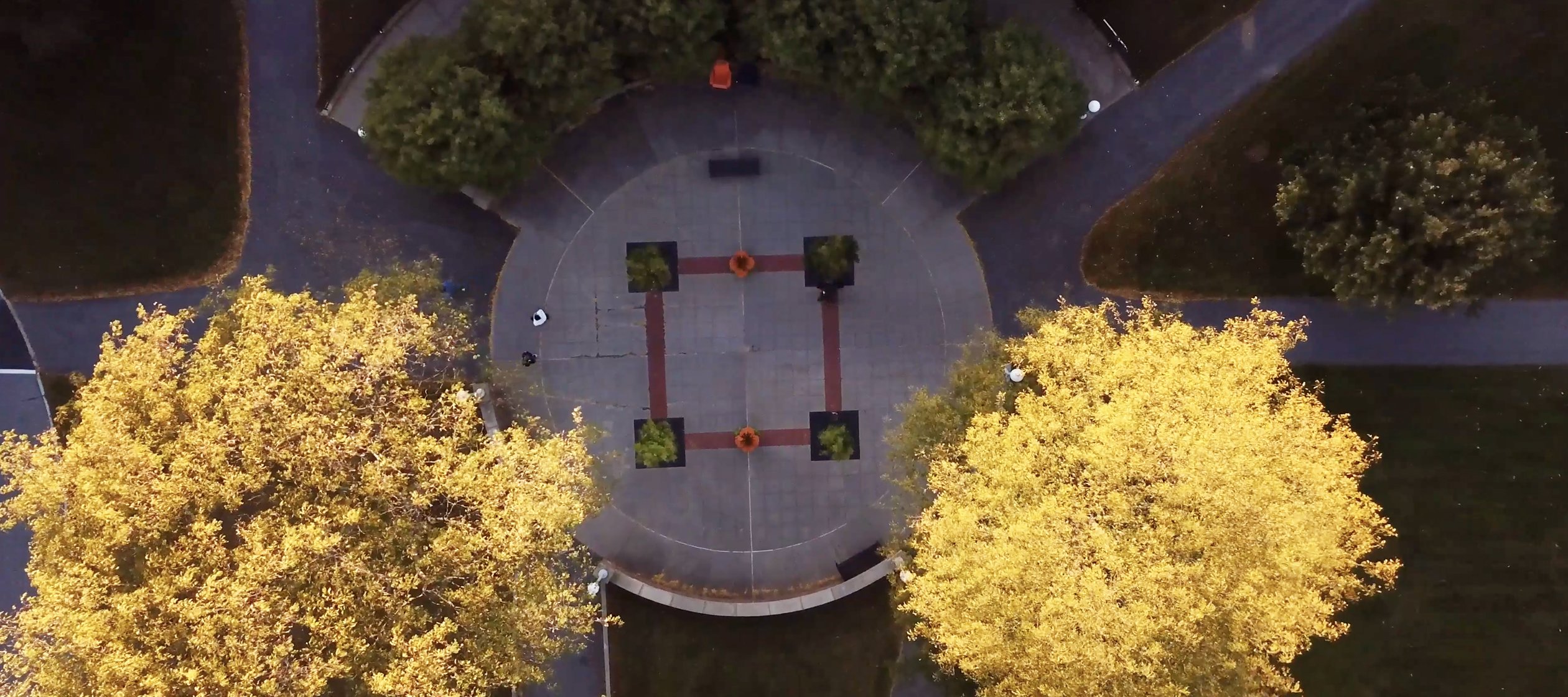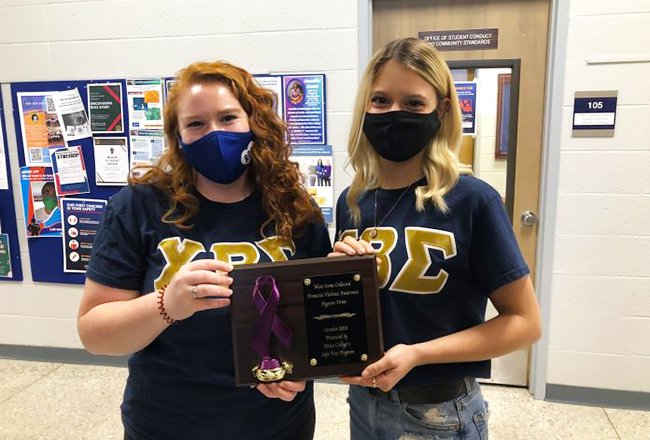Alicia C. Reed, M.P.H.


Utica University is responding to dating violence, domestic violence, sexual assault, and stalking (DVSAS) through systemic and sustainable changes. At a high level, change is made through reviewing and updating policies and procedures relating to DVSAS. At a lower level, changes are made through training and programming.
The initiatives from this office are led by the Director of Victim Advocacy and Violence Prevention Initiatives with collaboration from various partners. This programming occurs through the Office on Violence Against Women Campus Grant Program.
Dating/Domestic Violence Resource Card
For individuals to engage in sexual activity of any type with each other, there must be clear affirmative consent from everyone involved. The term “affirmative consent” means: a knowing, voluntary, and mutual decision among all participants to engage in sexual activity. Consent can be given through words or actions that clearly show permission and willingness to engage in sexual activity. Silence or lack of resistance do not show consent.
To give affirmative consent, a person must be of legal age, which is 17 years old in New York State.
The meaning of affirmative consent does not change based on a person’s sex, sexual orientation, gender identity, or gender expression. Under this policy, “No” always means “No.” Additionally, silence or not saying “No” explicitly cannot be assumed to indicate consent.
Incapacitation occurs when an individual lacks the ability to knowingly choose to take part in sexual activity.
Incapacitation may be caused by:
Use of alcohol or other drugs does not, in and of itself, negate a person’s ability to give affirmative consent. However, depending on the degree of intoxication, someone who is under the influence of alcohol or drugs or other intoxicants may be incapacitated and therefore unable to consent.
A person who has been drinking or using drugs is still responsible for ensuring that the other person provides affirmative consent to engage in sexual activity.
An individual’s incapacity may also be caused by consuming “date-rape” drugs.Possession, use, and/or distribution of any of these substances (including Rohypnol, Ketamine, GHB, Burundanga, and others) is prohibited. Administering any of these drugs to another person for the purpose of inducing one to consent to sexual activity is a violation of Utica University's Sexual Misconduct Policy.
All members of the Utica University community have resources available to discuss sex-based harassment, sexual misconduct concerns, or questions. Individuals who have experienced sex-based harassment or sexual misconduct are encouraged to seek support for their physical and emotional needs.
Students looking for confidential emotional or medical care may contact these resources:
Utica University Student Health and Wellness Center
204 Strebel Student Center
(315) 792-3094
Bethany VanBenschoten
Schedule a Meeting
(315) 792-5294
bavenben@utica.edu
Note: This confidential source is responsible for reporting non-identifiable statistics as required by the Clery Act
Oneida County's YWCA Domestic and Sexual Violence Services
24-Hour Hotline: (315) 797-7740
Note: This confidential source is responsible for reporting non-identifiable statistics as required by the Clery Act
The health and counseling services noted above are free for Utica University students.
These resources allow students to discuss their concerns or situations and explore available options. These resources also offer the opportunity to gain information about the University’s formal complaint procedures.
When students make reports to these resources, no personally identifiable information will be reported to other university officials. Reports made to some of these individuals may result in a report to university officials that an incident occurred but will not result in the reporting of any personally identifiable information. Because of this, if someone makes a report only to these confidential resources, they should not expect the University to take action against any alleged perpetrator.
Additionally, if a student discloses actions constituting a violation of a DVSAS policy through public events, such as “Take Back the Night” or another event or forum, the university is not required to start an investigation. However, the information may be used to improve education and prevention efforts on campus.
Confidential reports of any form of sexual misconduct can also be made to off-campus resources, including:
Oneida County’s YWCA Domestic and Sexual Violence Services*
(315) 797-7740
Note: This confidential source is responsible for reporting non-identifiable statistics as required by the Clery Act
Suicide/Crisis Services
24 Hour Hotline: 988
NYS Office of Victim Services
Hotline: 1-800-247-8035
National Domestic Violence Hotline
Phone: 1-800-799-7233 (or if you are unable to speak safely, log onto thehotline.org or text LOVIES to 1-866-331-9474)
RAINN Hotline (National Sexual Assault Hotline)
Phone: 1-800-656-HOPE (or 1-800-656-4673)
Crisis Services for our Liverpool, NY site:
Vera House
723 James St.
Syracuse, NY 13203
Phone: (315) 425-0818
24-Hour Hotline: (315) 468-3260
Sexual Assault Nurse Examination (SANE) services are provided to all area emergency rooms through Vera House.
Crisis Services for our Latham, NY site:
New York State Coalition Against Sexual Assault
30 N. Greenbush Rd. Suite 3
Troy, NY 12180
Phone: (518) 482-4222
Crisis Services for our St. Petersburg, FL site:
Suncoast Center, Inc.
PO Box 10970
St. Petersburg, FL 33733
Phone (appointments): (727) 388-1220
Hotline: (727) 530-7273
In addition to the resources listed above, Utica University has a Memorandum of Understanding (MOU) with Mohawk Valley Health System in Utica, NY. This MOU ensures that any member of the university community who is a victim of sexual assault can get a sexual assault examination. This examination will be conducted by a sexual assault nurse examiner or through a physician referral to a sexual assault nurse examiner.
When someone shares information with a confidential resource (on or off campus) as part of a protected, private conversation, that resource cannot disclose the information to any third party without the individual's written permission. This includes sharing details about whether a person has received services. The only exception to this is when it is permitted or required consistent with ethical or legal obligations. Thus, a report to a confidential resource is not a report to the University and will not result in an investigation or disciplinary action.
Anyone with a complaint of sex-based harassment or sexual misconduct is encouraged to report it. Reports can be made to the Title IX Coordinator or a Title IX Deputy Coordinator. Reports can also be made to any university employee who is a mandatory reporter.
All university personnel are non-confidential mandatory reporters. The only exception to this is any specifically identified confidential employees. This includes Health & Wellness Center personnel. Non-confidential personnel who see or learn about potential sex discrimination (including sex-based harassment) or other forms of sexual misconduct, must respond as follows:
Custodial, Facilities, Bookstore and Dining Services personnel, other than those in administrative leadership positions, must either:
(a) report such information to the Title IX Coordinator, or
(b) provide any person who shares information about such conduct with the Title IX Coordinator’s contact information and information about how to make a complaint.
All other University personnel must report such information to the Title IX Coordinator.
If you are unsure of an individual’s reporting obligations, please ask before sharing information you want to remain confidential.
University offices and employees will keep your privacy as much as possible, even those who cannot guarantee confidentiality. Information shared with non-confidential resources will be shared only as needed for the Title IX Coordinator to investigate or seek a resolution. Non-personally identifiable information may be shared with the Vice President for Emergency Management for statistical reporting on Clery reportable crimes.
To make a report directly to a Title IX Coordinator or Deputy Coordinator, please contact the following:
Title IX Coordinator
Kyle Wilson
Phone: (315) 792-3063
Email: klwilson@utica.edu
124 Addison Miller White Hall
Deputy Title IX Coordinator
Kristin St. Hilaire, Director of Athletics and Physical Education
Phone: (315) 792-3051
Email: kmsthila@utica.edu
Clark Athletic Center
Emergency access to the Title IX Coordinator is made available through contact with the Office of Campus Safety. Find more information about Title IX here: Title IX at Utica University | Utica University.
Utica University offers programs each year to prevent domestic violence, dating violence, sexual assault, and stalking. These programs include various campaigns, strategies, and initiatives to raise awareness, teach students and staff, reduce risks, and promote prevention.
Educational sessions are offered to all new students and employees. The sessions take place during orientation and throughout an incoming student’s first semester. Throughout the year, the university also runs ongoing campaigns for students and employees, including faculty. Campaigns may include:
The programs focus on important messages about awareness, primary prevention, and the university’s policies on sexual misconduct. They also provide information about New York State’s definitions of domestic violence, dating violence, sexual assault, stalking and consent in reference to sexual activity.
The university encourages bystander engagement by teaching safe and positive ways to intervene and prevent harm. This may include calling for help, using intervention-based apps, finding allies, and creating distractions.
Programs also provide information on risk reduction that strives to empower victims to recognize warning signals and avoid potential attacks. They do this by using approaches that do not blame the victims.
Traditional prevention programs may only approach men as potential perpetrators and women as potential victims. Green Dot approaches all students, staff, administrators, and faculty as allies. The original Green Dot program was conceived in the college setting to prevent dating violence, sexual violence, and stalking. It relies on the idea that if everyone does their small part and commits to individual responsibility, the combined effect is a safe campus culture that is not tolerant of violence.
The college-based curriculum draws heavily on the experiences of college students and the reality of these issues in their lives. This curriculum uses interactive activities to reinforce core concepts and encourages students to envision their future and the world in which they want to live. It then aligns their bystander behavior with that vision. Learn more about Green Dot at Utica University:
https://alteristic.org/services/green-dot/green-dot-colleges/
These support resources link to a range of organizations, hotlines, and crisis centers for LGBTQ+ individuals facing violence. Please know that these resources can be used independently from or in conjunction with the Office of Victim Advocacy.
YWCA Mohawk Valley is our community-based victim service provider. YWCAMV provides crisis services, transitional housing, prevention education, and mental health therapy related to DVSAS trauma.
The Trevor Project has a 24/7 crisis intervention and suicide prevention hotline for LGBTQ+ young people (ages 13-24). Call (866) 488-7386 or text ‘START’ to 678-678 for support. The Trevor Project also offers peer support, education, research reports, and other advocacy resources.
The Network/La Red is a survivor-led, social justice organization that works to end partner abuse in lesbian, gay, bisexual, trans, kink, polyamorous, and queer communities. One of the many resources they offer is a free and confidential 24-hour hotline at (800) 832-1901.
More about the Network / La Red
The Commission on Domestic & Sexual Violence, through the American Bar Association, works to increase access to justice for victims of domestic violence, sexual assault, and stalking by mobilizing the legal profession. The commission offers individualized support, training, and technical assistance to address domestic violence and sexual assault in LGBTQ+ communities.
The LOFT LGBTQ+ Community Center is located in White Plains, NY and works to support and advocate for safety, security, and rights of the LGBTQ+ community.
American Civil Liberties Union (ACLU) fights for freedoms at the federal and state levels. The ACLU tracks proposed and passed legislation targeting the LGBTQ+ community.
ACLU: Anti-LGBT Bills in the U.S.
The LGBT National Help Center provides peer support, community connection, and resource information. They offer a hotline at (888) 843-4564 and peer support chats, among other resources.
Students and staff who are victims or survivors of sexual and interpersonal violence receive the same right under Title IX and the Violence Against Women Act (VAWA), regardless of immigration and visa status. Information about on-campus and off-campus resources can be found above. Information about available accommodations, may be found through the Office of Learning Services. Information about the student conduct process may be found through the Title IX page. The university will not retaliate against you or treat you differently based on reporting a crime.
National Organization for Women has information and resources about intimate partner violence among undocumented and immigrant women:
Learn More: Intimate Partner Violence and Immigrant Women!
Domestic Shelters has A Guide to Domestic Violence for U.S. Immigrants that includes helpful information and resources:
A Guide to Domestic Violence for U.S. Immigrants
The Alliance for Immigrant Survivors is a national network of advocates and allies dedicated to defending and advocating for policies that ensure immigrant survivors of domestic violence, sexual assault, trafficking, and other gender-based abuses have access to life-saving protections that all survivors of violence deserve.
Alliance For Immigrant Survivors
The Stalking Prevention, Awareness, and Resource Center has information about stalking behaviors targeting immigrant victims that can be found here:
Stalking Behaviors Targeting Immigrant Victims
Asian Women’s Shelter aims to eliminate domestic violence by promoting the social, economic, and political self-determination of women and all survivors of violence and oppression. They have a 24-hour crisis hotline at 1 (877) 751-0880.
The National Domestic Violence Hotline provides crisis intervention, information and referral to victims of domestic violence, perpetrators, friends and families at 1 (800) 799-7233 or by texting “START” to 88788. Assistance is available in English and Spanish with access to more than 170 languages through interpreter services.
Domestic Violence Support | National Domestic Violence Hotline
Students and staff who are victims or survivors of sexual and interpersonal violence receive the same right under Title IX and the Violence Against Women Act (VAWA), regardless of if they have a disability. Information about on-campus and off-campus resources can be found above. Information about available accommodations, may be found through the Office of Learning Services. Additional resources that may be beneficial for students with disabilities can be found below.
The National Center for College Students with Disabilities has a list of online resources for those who are in crisis or need immediate help.
National Center for College Students with Disabilities
The National Domestic Violence Hotline has information and resources for people with disabilities who may be experiencing domestic/relationship violence.
People with Disabilities and Domestic Violence - The Hotline
The Deaf Hotline is a 24/7 hotline that is ASL accessible for people experiencing abuse. With the Deaf Hotline, you can consult with a culturally-adept and trained advocate in ASL. They can provide safety planning, crisis intervention, and emotional support, among other things.
CCRT Mission: We are a diverse alliance of dedicated advocates and professionals who serve to educate, protect, and support our campus community. This is done by preventing and addressing dating violence, domestic violence, sexual assault, and stalking.
The CCRT consists of campus and community partners who meet once a month to address and respond to matters related to DVSAS. The work of the CCRT includes developing training, educational materials, and programming.
To nominate or self-nominate a student, faculty, staff, or administrator to join the CCRT, email Alicia Reed at acreed@utica.edu.






Read this Tangerine article about the Utica University Safe Trax program Domestic Violence Awareness Hygiene Drive for the month of October
View Story


For a general list of frequently used logins, you can also visit our logins page.